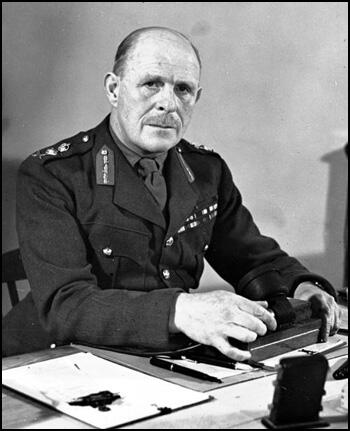John Gort
John Gort, the son of 5th Viscount Gort, was born in County Durham in 1886. He succeeded his father as 6th Viscount Gort in 1902. Educated at Harrow and the Royal Military College, Woolwich, he was commissioned into the Grenadier Guards in 1905.
During the First World War Gort was mentioned in dispatches nine times and won the Military Cross. On 27th September 1918, Gort won the Victoria Cross at Canal du Nord.
After the war Gort taught at the Staff College and was promoted to the rank of colonel in 1925. He also served as Commander of the Guards Brigade (1930-32), Director of Military Training in India (1932-36) and Commander of the Staff College (1936-39).
Gort was made a full general in 1937 and later that year was appointed Commander-in-Chief of the Imperial General Staff.
In 1939 Gort was Commander-in-Chief of the British Expeditionary Force (BEF) that went to France. The German offensive through the Ardennes during the invasion of France in May, 1940, left 10 divisions of the BEF caught and gradually squeezed onto the beaches of Dunkirk.

On his return to England he became A.D.C. to George VI. He also served as Governor of Gibraltar (1941-42), Governor of Malta (1942-44) and High Commissioner of Palestine (1944-45).
John Gort died in March, 1946.
Primary Sources
(1) In his memoirs Bernard Montgomery was highly critical of General John Gort and the British Expeditionary Force during the German Western Offensive.
I have always held the opinion that Gort's appointment to command the B.E.F. in September was a mistake; the job was above his ceiling. Moreover, G.H.Q. of the B.E.F. had never conducted any exercises, either with or without troops, from the time we landed in France in 1939 up to the day active operations began in May 1940. The need for wireless silence was given as an excuse; but an indoor exercise on the model could easily have been held. The result was a total lack of any common policy or tactical doctrine throughout the B.E.F.; when differences arose these difficulties remained, and there was no firm grip from the top.
(2) As commander of a machine-gun battalion, Brian Horrocks served under General John Gort during the German Western Offensive. He later wrote about Gort in his autobiography A Full Life (1960)
The man for whom I felt most sorry was our commander-in-chief, Lord Gort. The French seemed to have gone to pieces on his right, yet he was under their command, and the orders he received didn't make sense. At the same time he was responsible to the British Government for the safety of the British troops. And then, as a final blow, the Belgian Army on his left was forced to capitulate.
Gort was neither a great strategist nor a deep military thinker. He couldn't stand up at a conference and deliver a brilliant military appreciation. Even when C.-in-C. he remained essentially a front- line regimental officer who was always more interested in the details of battle than in the strategical picture. Yet, where a more brilliant soldier might have lost his nerve, Gort remained staunch to the end, and thus showed the one essential quality required in times of adversity by all commanders-mental toughness. I have always felt that he never received the credit which was his due.
